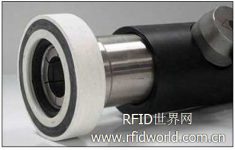
Viridis uses RFID to ensure the safety of CNG vehicle inflation
[ad_1]
Vehicles using CNG (compressed natural gas) gas usually contain a steel cylinder that stores gas fuel. At the gas station, the gas is quickly injected into the cylinder at a pressure higher than the pressure in the tank. However, if the vehicle cylinder does not meet the standard specifications, or the cylinder is not inspected before refilling, it may cause an explosion when refilling. Now, Viridis, the provider of GNG and hydrogen vehicle fuel dispensing systems, has developed an RFID system to ensure the safety of CNG vehicles and the accuracy of billing.
The customers of Viridis CNG dispensers are sold all over the world, including GNG gas station operating companies and individuals.However, Viridis cannot guarantee the sale of splits
The correct use of the device, that is, the user detects whether the vehicle cylinder meets the safety and inspection standards, and the introduction of the RFID system will change this status quo.

The Viridis CNG dispenser includes a nozzle with an embedded antenna
The Viridis RFID system includes Texas Instrument’s low-frequency tags and readers that meet the ISO 11785 standard, a special antenna embedded in the gas dispenser nozzle, and customized software for data management. The RFID tag is glued with a strong epoxy resin near the vehicle gas valve and is located within 4 inches of the tag’s reading distance. The Viridis software collects tag data and controls the dispenser. Only when the valid tag is read, the system starts to inject gas into the vehicle.
The exact written data of the label is determined by the regulatory bodies of different countries. Usually, the tag data includes the vehicle’s serial number (such as VIN), driving number, owner’s name, and the latest inspection date of the fuel cylinder. If a non-GNG vehicle is retrofitted with GNG gas, the retrofit data and the retrofit company’s information will also be written on the tag.

Viridis sells CGN dispensers worldwide
To improve air quality and cope with rising fuel costs, many countries-especially Asia, India, Bangladesh and Pakistan-have mandated the use of CNG engines to replace traditional gasoline-fueled vehicles. Currently, these countries have tens of thousands of GNG buses and other vehicles, such as tricycles.
At the same time, these countries have also set relevant safety standards, stipulating that vehicles must use specific types of cylinders and comply with safe gas dispensing methods. However, these standards are often ignored, and the number of deaths and injuries caused by this continues to rise.
“In many countries, people may use cylinders that do not meet specifications in order to save money. If the cylinder is not designed for CNG gas, it will cause accidents.” Patterson said.
In order to ensure that the system only accepts valid tags and cylinders, the Viridis software encrypts the data when the tags are written. The software that controls the fuel dispenser reads the label and decrypts the information. Since gas stations are usually located in remote areas and the Internet connection is unstable, Patterson said the software that reads and confirms tag ID numbers can be operated offline. In addition, the car owner can choose to match the credit card information with the ID code of the tag to speed up the payment process.
Patterson said that the company is currently in contact with several Southeast Asian customers and plans to launch a pilot project in the region to test the RFID system.
[ad_2]




